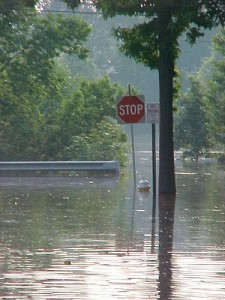Over the weekend, hurricane Irene brought with her 100+ mile per hour winds, storm surge, and extremely high levels of rainfall. This type of weather can create all kinds of problems for homeowners. So what kinds of things should you be looking for around your home to keep things safe?
Don’t Go Into Flooded Areas: First, be sure you don’t go into any areas in or around your home that have standing water. If your basement has flooded or your yard is inundated, there are dangers lurking below the surface that can inflict serious harm or even kill you. Probably the most dangerous situation created by flooding is the possibility of electrocution. Your home has electricity running throughout. This includes outlets, electric panels, electrical cords, outlets strips…etc. When water touches any of these, you have a dangerous situation. One other thing to consider, if there is a downed power line around your property, keep a safe distance away. You don’t have to touch a live wire to get electrocuted! The electricity can arc through the air and through your body to get to the ground.
Don’t Drink the Water: Another possible danger in flooded areas lies in the water itself. Flood waters are usually contaminated from fertilizers, sanitary sewers, chemicals…etc. so you want to avoid contact with your skin. You may also want to check with the local authorities before drinking water out of the faucet. When storms shut off power to water pump stations, the pressure in the pipes drop and contaminates can get into the water supply. If you can’t get ahold of your local water authority, assume the water is unsafe and boil it for a minute before drinking (and/or use treating tablets).
Dry Out Your Home: Heavy winds can drive rain into places that it normally wouldn’t go. So, once the storm subsides you will want to check your entire home from top to bottom for any wet or moist areas. Your goal is to set the proper conditions so that any parts of your home that are wet (and shouldn’t be) dry out as quickly as possible. So let’s say for example that the wind gusts blew rain through the ridge vent on your roof. If there is any water standing on the drywall in the attic, you want to drain or remove it as soon as you can to prevent any further damage. You can do this by poking holes in your ceiling and placing buckets under the holes to catch the water. You may also want to pull aside any wet insulation to allow air to circulate around the wet area.
If your basement has water in it, you will want to pump it out. Again, do not touch the water if there is any possibility of electrical current. Once the water has been pumped out, a fan blowing through the basement will help the drying process. Open any windows you have to ventilate the area . A dehumidifier is also a good thing to have to remove the moisture from the air. Remove any items that are saturated from the basement including boxes, rugs, curtains…etc.
Check for Missing Components: High winds can also blow off siding, shingles, and soffit/roof vents so you will want to carefully check your roof, soffits, and siding for any damaged or missing components. Carefully do a walk around of your home to make sure everything is still in tact. Something as simple as a missing shingle can cause major damage if it goes unnoticed. Also check for obstructions in your gutters and downspouts if you have them. High winds can blow items onto your roof that wouldn’t otherwise be there and these items can clog gutters which can lead to leaks.
Review Storm Drains: The last thing I like to check in and around my yard after a large rainfall are any storm drains. Basement window wells typically have a drain in them so make certain there are no leaves or other debris clogging the drain. The same goes for any large storm sewer drains in your yard. Make sure they are clear of debris.
This is just a quick checklist to keep your home safe and sound. Check out our ESTORE for a more complete Troubleshooting Guide for homes.
1 Comment for Irene Caused Major Damage…How to Check Your Home
water damage Cincinnati | September 1, 2011 at 2:15 pm



Heya i”m for the first time here. I found this board and I find It truly useful & it helped me out much. I hope to give something back and help others like you helped me.